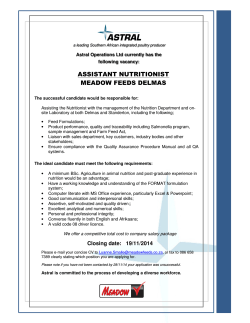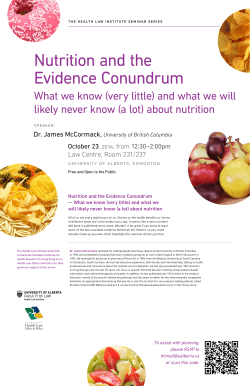
Nutrition and COPD
Nutrition and COPD What we will cover: • Malnutrition and COPD • Oral nutrition supplements • Recommended dietary patterns for people with COPD • Bone Health • Obesity • Micronutrient supplements Katherine Stern Dietitian 10/10/2014 Malnutrition Malnutrition is more prevalent in people with COPD 25-40% of patients with COPD are malnourished Observational studies suggest being underweight (<BMI <18.5-20) is associated with increase disease severity and poorer prognosis. ESPEN Guidelines 2006 Impact of Malnutrition Reduced ability to fight infections Impaired wound healing, longer hospital stays and recovery time Muscle wasting- reduced ability to do usual activities and lower exercise capacity Impaired temperature regulation ‘feeling the cold’ Micronutrient deficiencies BAPEN 2012 Identifying Malnutrition Malnutrition can be described as: 5% unintentional weight loss in 3 months 10% unintentional weight loss in 6months Underweight <BMI 18.5-20 Muscle and fat wasting PEN (Practice-based Evidence in Nutrition )2010 Increased energy requirements Varied total energy requirements due to differences in resting energy expenditure and physical activity. Estimated 5-10% increase in resting energy expenditure in acute COPD exacerbations. PEN (Practice-based Evidence in Nutrition )2010 Chewing and swallowing problems Reduced intake due to chewing/swallowing problems secondary to breathing problems Small frequent meals Soft, easily chewable foods Convenience foods/ foods that require little preparation Meals on Wheels, other provides e.g. Eat Oral Nutrition Supplements The most recent systematic reviews and meta-analysis’s have shown a benefit of nutritional supplements for people with COPD. Systematic Review in The American journal of clinical nutrition 2012 Cochrane Systematic Review 2012 “ Moderate quality evidence that nutritional supplements promote weight gain among patients with COPD, especially if undernourished” High fat, low carbohydrate Supplements? Pulmocare supplement- available on special authority for people with COPD and hypercapnia CO2 >55mgHg Theory: fat produces less CO2 per O2 molecule consumed than carbohydrate decrease respiratory quotient (RQ) Conflicting evidence of a benefit on improved lung function in individuals with COPD ESPEN 2006/ PEN 2010 Recommended dietary patterns for people with COPD 1-2 servings (palm size) of meat or meat alternatives A serving (about fist size) of carbohydrates at each meal (preferably wholegrain) 2-3 servings of milk and milk alternatives 2 or more servings of fruit and 3 or more servings of vegetables Bone Health Osteoporosis and bone fracture risk higher in people with COPD. Especially important if on steroids, low BMI, low fat free mass, older adult >65+ Adequate calcium sources- 3 or more serving Adequate Vitamin D- consider supplements PEN (Practice-based Evidence in Nutrition )2010 Obesity and COPD People with stable COPD and obesity may benefit from weight reduction. Extra weight may worsen exercise tolerance and increase dyspnea. Weight reduction may be more beneficial for those with OSA and Asthma. Encourage increased exercise alongside dietary changes to prevent losses of muscle mass PEN (Practice-based Evidence in Nutrition )2010 Micronutrient Supplements Studies have not shown a benefit or lack of studies to support supplementation for Vitamin C, E, beta-carotene, selenium, magnesium, omega 3 and omega 6. Vitamin D- consider supplementation for bone health Comprehensive Multivitamins e.g. Centrum if poor intake PEN (Practice-based Evidence in Nutrition )2010 Summary Achieving adequate nutrition can be a challenge for some people with COPD and malnutrition in common in this patient group Recent meta-analyses have shown a benefit of nutritional supplements Ensure adequate intake of calcium sources and consider vitamin D supplementation Consider weight reduction for those with obesity and stable COPD. References Ferreira IM, Brooks D, White J, Goldstein R. Nutritional supplementation for stable chronic obstructive pulmonary disease (Review). The Cochrane Library 2012 Issue 12. Collins PF, Strutton RJ, Elia M. Nutritional support in chronic obstructive pulmonary disease: a systematic review and meta-analysis. Am J Clin Nutr 2012; 95:1385-95. Anker SD, John M, Pedersen PU et al. ESPEN (European Society for Parenteral and Enteral Nutrition). ESPEN Guidelines on Enteral Nutrition: Cardiology and Pulmonology. Clin Nutr. 2006 April ;25(2):311-8. BAPEN (British association for parenteral and enteral nutrition) http://www.bapan.org.nz PEN (Practise evidence based Nutrition) Nutrition and COPD pathway updated 2010.
© Copyright 2025















